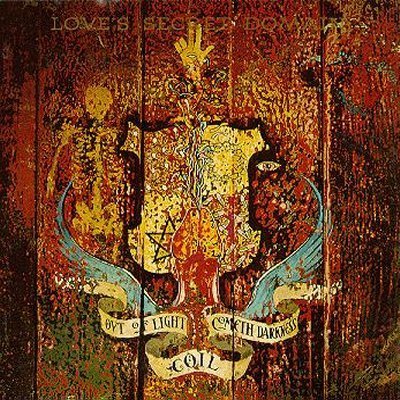Coil, "Love's Secret Domain" (Lucas Schleicher)
I don't believe Sleazy for a minute when, in interviews, he calls Love's Secret Domain a "positive" recording. After making Horse Rotorvator, sounding more positive was probably as easy as finding something softer than a hammer. If there is a positive thread running through Coil's third full-length, songs like "Things Happen" and "Titan Arch" dye it black; if anything purely positive is left over, "Further Back and Faster" and "Chaostrophy" obliterate it entirely. I've been listening to L.S.D. for 15 years now, and I'm convinced that it is Coil's most beguiling record, a fun-house mirror that warps and subverts everything held up to it. Calling it their acid album is just insulting, because there's much more to it than the drugs that helped spawn it.
In a 1992 interview published in Option Magazine, Scott Lewis describes the lyrics on Coil's latest record as "lighter" and "more optimistic," and bafflingly, Peter and John concur. In fact, the same thing happens in numerous interviews.
I remember hearing "Love's Secret Domain" and "Teenage Lightning 2" for the first time and my opinion then was the same as it is now: in the wake of Horse Rotorvator's trials, Coil had opted to embrace deliriousness rather than dive further into the murk of their previous work. Perhaps their music had become lighter in some respects, but that didn't mean they had become lighthearted. Balance wasn't screaming about Nero's long hot tongue anymore, but he was meditating on sick love, quoting William Blake and Roy Orbison in the same song, and Peter was piling sound upon sound, cutting heavily processed vocals with Latin rhythms and caustic bursts of bubbling noise. By working with Little Annie, Marc Almond, This Heat's Charles Hayward, Juan Ramirez, and Billy McGee, Coil opened up their sound and gave their audience a chance to come up for air, but at the same time they became subtler, devious even, and more enigmatic.
On L.S.D., martial rhythms replace dance floor rhythms, and resonant synthesizers replace apocalyptic horns, but Coil's subversive spirit remains intact. The proof isn't in every song, but in the way certain pieces color others. On one half of the album, "Windowpane" and "The Snow" celebrates ecstasy and hedonistic impulses, but the lurch of "Further Back and Faster" scrutinizes both, with lines from Charles Laughton's Night of the Hunter utilized to blur the line between love and hate. Laden with pounding drums and constantly shifting rhythms, "Further Back" disrupts the playfulness of the songs around it by taking that playfulness to its limit. "Chaostrophy" follows suit; radio signals, distortion, orchestral fragments, frustration, and sadness all fight with each other as one of the most beautiful melodies Peter ever wrote emerges from the chaos, half triumphant and half resigned. Billy McGee's arrangement is stunning, and Julia Girdwood's oboe sounds heavenly among the strings and reverberating noise, but it's resigned, too, almost too pretty for the chaos around it. "Lorca Not Orca" follows, but the Latin rhythms from earlier have lost their vigor, and all that's left is for Jhonn to sing his ode to mad love. As he puts it, "innocence is dripping red."
Thematically, there are numerous reasons to characterize L.S.D. as a foreboding record. Sonically, I think its ominous character is obvious. Play it back to back with Horse Rotorvator and Gold is the Metal with the Broadest Shoulders and the jubilant character it is so often assigned disappears instantaneously. Coil's acid album, or their party album, or their dance record isn't an acid-dance-party record at all. Rather, it exists in continuum inhabited by the albums that precede it, and even by some that follow it. But there isn't another record like it out there; nothing else in my collection successfully combines so many ideas into a single statement.
Personally, I'll always remember hearing "Teenage Lightning 2" for the first time and being carried away by its density. I remember feeling a little stupid when I discovered that some of the melody was actually a heavily processed voice, and I remember the excitement I felt when I realized what could be done with texture and noise. Coil helped open my brain up, even without the use of drugs, and their influence, largely due to this album, has stayed with me to the present.
Ultimately, Love's Secret Domain changed the way I listen to music; it was the right record for me at the right time, and after 15 years I'm still hearing new things in it every time I listen.
 


 Threshold House
Threshold House
